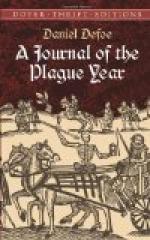Not far from the same place they blew up a watchman with gunpowder, and burned the poor fellow dreadfully; and while he made hideous cries, and nobody would venture to come near to help him, the whole family that were able to stir got out at the windows one storey high, two that were left sick calling out for help. Care was taken to give them nurses to look after them, but the persons fled were never found, till after the plague was abated they returned; but as nothing could be proved, so nothing could be done to them.
It is to be considered, too, that as these were prisons without bars and bolts, which our common prisons are furnished with, so the people let themselves down out of their windows, even in the face of the watchman, bringing swords or pistols in their hands, and threatening the poor wretch to shoot him if he stirred or called for help.
In other cases, some had gardens, and walls or pales, between them and their neighbours, or yards and back-houses; and these, by friendship and entreaties, would get leave to get over those walls or pales, and so go out at their neighbours’ doors; or, by giving money to their servants, get them to let them through in the night; so that in short, the shutting up of houses was in no wise to be depended upon. Neither did it answer the end at all, serving more to make the people desperate, and drive them to such extremities as that they would break out at all adventures.
And that which was still worse, those that did thus break out spread the infection farther by their wandering about with the distemper upon them, in their desperate circumstances, than they would otherwise have done; for whoever considers all the particulars in such cases must acknowledge, and we cannot doubt but the severity of those confinements made many people desperate, and made them run out of their houses at all hazards, and with the plague visibly upon them, not knowing either whither to go or what to do, or, indeed, what they did; and many that did so were driven to dreadful exigencies and extremities, and perished in the streets or fields for mere want, or dropped down by the raging violence of the fever upon them. Others wandered into the country, and went forward any way, as their desperation guided them, not knowing whither they went or would go: till, faint and tired, and not getting any relief, the houses and villages on the road refusing to admit them to lodge whether infected or no, they have perished by the roadside or gotten into barns and died there, none daring to come to them or relieve them, though perhaps not infected, for nobody would believe them.
On the other hand, when the plague at first seized a family that is to say, when any body of the family had gone out and unwarily or otherwise catched the distemper and brought it home—it was certainly known by the family before it was known to the officers, who, as you will see by the order, were appointed to examine into the circumstances of all sick persons when they heard of their being sick.




